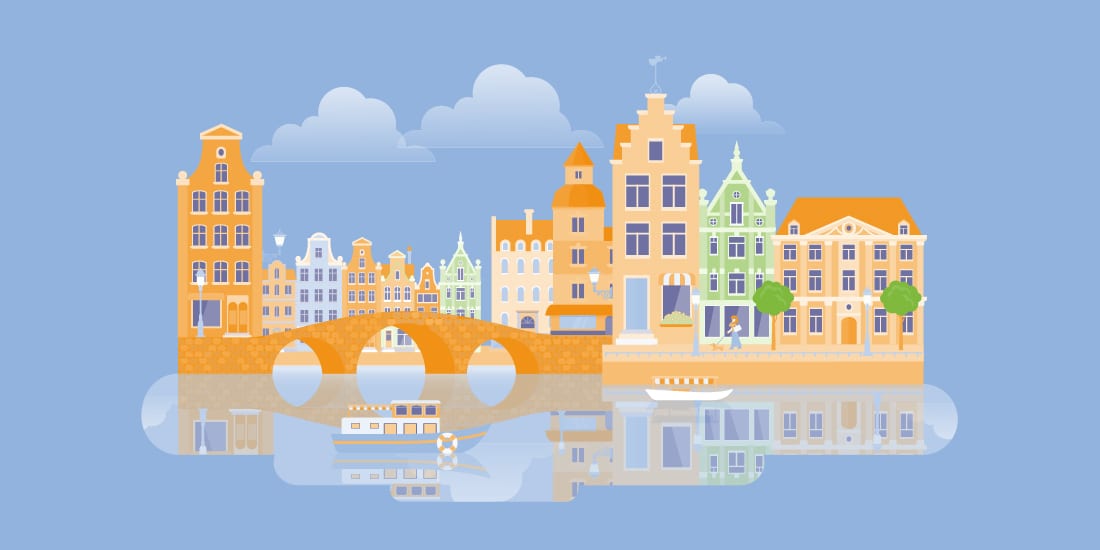
History Of The Netherlands
12 Mar History Of The Netherlands
History of the Netherlands
If we don’t learn from our past, we won’t be able to have a better future. This is why every country has to learn from its past mistakes. It is the only way nations can move forward. It is true that some mistakes are not that easy to forget, but if we remain stuck in the past, we won’t be able to prepare for the future. There are some countries whose past tells us about different people. For instance, Dutch history can teach us about the Vikings who raided different parts of the country. But most importantly, the past can teach us how people came to live the way they do. What choices led them to their current situation, and how we can improve their lives for good.


The Netherlands:
The Netherlands, informally known as Holland, is a Western European country. Parts of the Netherlands are located in the Caribbean. The Netherlands has twelve provinces and shares its borders with Germany, Belgium, and the United Kingdom. The most populous city is Amsterdam, which is also the nominal capital. But it is The Hague that holds the seat of the Supreme Court, the Cabinet, and the States-General. Amsterdam, Rotterdam, the Hague, and Utrecht are the four largest cities in the Netherlands. The Hague is often referred to as “the world’s legal capital” because it hosts several international courts.
Dutch
Dutch is the official language of the country, predominantly spoken by the majority of the population in the Netherlands. It also serves as a language in Suriname, Sint Maarten, and various constituent regions of the Kingdom of the Netherlands in the Americas, establishing a linguistic connection between South Africa and North America. English functions as a co-official language and is widely spoken in major cities such as Amsterdam and The Hague. In addition to English, German is another prevalent foreign language in the country. Moreover, thousands of individuals in the Netherlands speak Spanish. English is a compulsory subject in schools, and at the university level, people can opt for classes in other foreign languages while delving deeper into Dutch history. This linguistic diversity in the Kingdom of Holland resonates with the cultural and linguistic variations found in regions like North Brabant and the West Frisian areas adjacent to the North Sea. This integration highlights the rich linguistic tapestry prevalent in these regions, promoting not only a global register export of languages but also a cross-cultural exchange of ideas and histories.
Religion
The majority of people don’t have a religion. 43.8% believe in Christianity, out of which 23.7% are Catholics, and 18.1% are Protestants. Dutch art, architecture, and philosophy have influenced many cultures around the world. Every city has its own attraction for the lovers of art and architecture. From England to France and Australia to North America and Sri Lanka, the Dutch influence can be observed everywhere. The country attracts millions of tourists every year. Amsterdam and its museums and canal cruises are the biggest attractions for young adults. The country is also the ideal tourist destination for art lovers. William of Orange, a significant figure in Dutch history, played a pivotal role in the country’s development.
History of the Netherlands:
Although the Netherlands is an independent country today, that wasn’t always the case. It had to struggle to win its independence. A study of the History of the Netherlands can tell us all about the struggle of its people. The earliest Dutch society was made up of seafaring people. The sea, lakes, and canals were impossible to cross for invaders, which is why they protected the inhabitants of the region for decades. Things changed when the Roman Empire conquered the land in the 1st Century BC and turned it into a military post. For three hundred years, the lands prospered under the Roman administration. The everyday life of people improved.
When the Roman state got weaker, things in Europe changed. Barbaric Germans invaded the Netherlands and established their government there. In the 5th Century, the Franks invaded the territory and brought Christianity with them. After the fall of the Franks, the territory got divided into smaller states to be ruled over by dukes and counts. During this time, the region saw amazing growth in agriculture, crafts, and commerce. This made the Netherlands one of the richest areas in Europe.
After the middle ages, the neighborhood powers began to fight for the region. Taxation was introduced to the region by the oppressors. When Philip II, the king of Spain, began his rule over Holland in the 16th Century, the Dutch people started their resistance. An eighty-year long war began during which the Dutch society realized the importance of national identity. Although the Union of Utrecht proclaimed independence from Spain in 1581, it wasn’t until 1648 that Spain recognized the Dutch State.
Mid-17th Century
In the mid-17th Century of Dutch History, the Dutch began exploring the seas again. They discovered new routes and began the biggest maritime power of Europe. It was also during this time that Amsterdam became the most important financial center in all of Europe. While this was happening in the seas, wars with England and France continued on land for dominance.


In the 18th Century, the domination of France began in Europe, while across the Atlantic in North America, significant shifts were underway. The time of the tiny Dutch Republic came to an end, coinciding with the birth of the Kingdom of the Netherlands. At that time, it also had control over territories in Belgium and Luxemburg, but later, these regions gained independence from the Netherlands.
In the second half of the 19th Century, the Netherlands experienced remarkable economic growth and embraced liberal ideas, fostering a period of prosperity. Meanwhile, across the globe in North America, industrialization and expansion were transforming the continent. In World War I, despite the chaos in Europe, the Netherlands remained steadfastly neutral, avoiding direct involvement in the conflict.
World War II
During World War II, the country was occupied by Germany. The stories of German torture of the Jewish people affected every family in the country. Conditions only got worse during the two years of the German occupation. People could not protect their friends and family members. Streets became the scene of absolute torture. Nazi Germany wanted to incorporate the Dutch settlements into the Third Reich. But the Dutch people, under the leadership of the Royal family, rebelled against the occupying forces. The roles of the members of the Royal family in the struggle are still fresh in the minds of the Dutch people.
The second half of the 20th Century was spent dealing with the scars that World War II gave the Dutch society. People worked hard to attain the comforts of life. They wanted to improve their society in a way that parents don’t have to worry about the safety of their daughter, or a sister does not have to worry about her brother. The history of concentration camps is not something that can ever be erased, but the Dutch people decide to work on their future. The economic history of the last few decades shows how far the Netherlands has come. It is one of the wealthiest countries in the world today.
The Future of the Netherlands:
The Dutch people had to face many issues in the past, navigating through turbulent times like the struggles against the Habsburg Netherlands and the Batavian Republic. It was the rebels, such as Frederick Henry and the Salian Franks of history, who championed the populace through these challenging periods. However, today, the Netherlands has evolved beyond the need for rebellion. It thrives in tranquility, leveraging its capabilities to manufacture goods independently and engage in lucrative trade with its neighbors like the United States and South Africa, forging its own terms for commerce, evident in historical ventures like the Dutch West India Company and its endeavors in the East Indies.
With a commitment to prioritizing its people, the Netherlands has emerged as one of the world’s most prosperous nations, boasting a populace that relishes a high quality of life. The country celebrates press freedom, a cornerstone upheld by institutions like Amsterdam University and publishers such as Cambridge University Press. The resilience displayed in rebuilding post-World War II reflects the nation’s promise for an even brighter future. Statistics Netherlands meticulously registers and documents these advancements, citing the nation’s economic growth and societal well-being. Embracing a donor privacy policy, the Netherlands continues to evolve, showcasing a trajectory of progress built on its historical resilience and contemporary diplomacy in global affairs.
People of the Netherlands
The future will only bring better news for the people of the Netherlands. The history books of tomorrow will tell of the struggle of the Dutch, from the 17th century when they established a powerful presence through entities like the East India Company and the West India Company, navigating the complexities of a constitutional monarchy under leaders like William III and William of Orange. Their far-reaching influence extended to places like South Africa, Sri Lanka, the Caribbean Netherlands, and the Spanish Netherlands. The Dutch, known for their contributions to art with figures like Vincent van Gogh, scientific advancements with Christiaan Huygens, and the resilience symbolized by Anne Frank, also made significant strides in foreign policy, engaging with regions across North and South America. With regions like North Holland and South Holland as their strongholds, alongside the legacy of leaders such as Prince William and William Frederick, the Netherlands stands poised to potentially surpass other European powers and emerge as the foremost economic powerhouse in Europe


